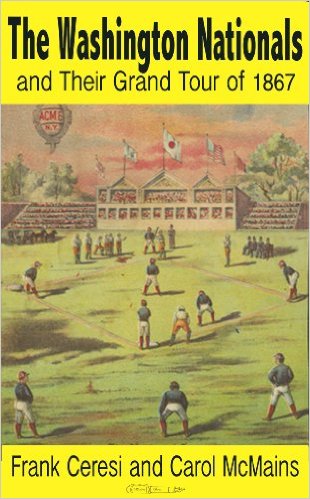
THE WASHINGTON NATIONALS AND THEIR GRAND TOUR OF 1867
By Frank Ceresi and Carol McMains
The story of the Civil War-era Washington Nationals, precursor to today’s team, is fascinating look into the earliest origins of the national pastime. Much has changed — the players were expected to pay to participate and there were no mitts or catcher’s masks. But the Nationals became the first sports team invited to the White House, the first to publish a box score, and the first to go on tour. The story of the Nationals, from their games on the field adjacent to the White House, from their ground-breaking tour to playing an all-black team that featured the son of Frederick Douglass, the book is illustrated with fascinating details and rare artifacts.
“It started innocently enough when a group of mostly Federal Government employees decided they should take a cue from their counterparts up north and form an organized baseball team. That team would be known as the National Base Ball Club. At first, the young men simply wanted to play ball, get a bit of exercise, and enjoy the open space around the Mall area. Things progressed from there. A careful review of the activities of the Nationals from their inception, during the Civil War, and throughout the key decade of the 1860’s clearly illustrates that the city’s Nationals would become quite significant to the development of the national pastime and the spread of its popularity.
How influential were they? The fact of the matter is that the Washington Base Ball Club would eventually help ignite a baseball boom that changed the landscape of sports in our country forever. The Nationals were one of the first prominent organized ball clubs in the country and in 1867 they embarked on a journey to the west that would sow the seeds of the game in communities throughout the land. Further, as news of their superb ball playing abilities on the diamond spread through the pen of journalist Henry Chadwick, one of our country’s first sportswriters, their popularity and influence deepened. The result was that by the end of the decade the Nationals became central to baseball’s becoming, as Walt Whitman would say, ‘America’s Game.'”
- Frank Ceresi and Carol McMains